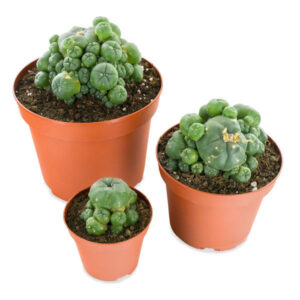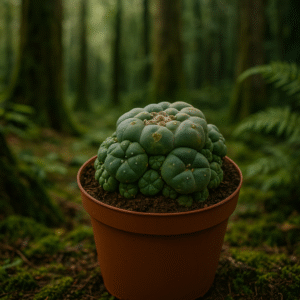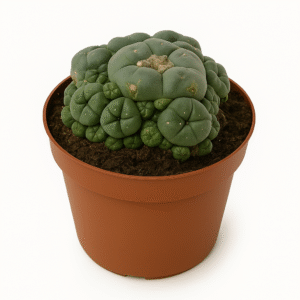Where to Buy Peyote Seeds (Legally and Safely) 1
Where to Buy Peyote Seeds (Legally and Safely)
Introduction to Peyote
What is Peyote?
Peyote (Lophophora williamsii) is a small, spineless cactus that has captivated the attention of spiritual seekers, scientists, and plant enthusiasts for centuries. Native to the Chihuahuan Desert of northern Mexico and southwestern Texas, peyote is renowned for its psychoactive properties, primarily due to its high concentration of mescaline—a naturally occurring psychedelic compound.
Unlike typical cacti with spines, peyote is soft, round, and button-like, typically growing low to the ground in harsh desert environments. These “buttons” are usually harvested and consumed either fresh or dried. But when it comes to seeds, we’re talking about a far more patient and intricate process—cultivating this sacred plant from the ground up.
Beyond its psychedelic effects, peyote holds deep cultural, historical, and spiritual importance. It has been used in Native American religious ceremonies for thousands of years, especially among tribes such as the Huichol, Tarahumara, and members of the Native American Church. This cactus isn’t just a plant; it’s considered a divine teacher and spiritual ally.
Understanding what peyote is—and what it represents—is the first step to approaching it with the reverence and responsibility it deserves.
Cultural and Spiritual Significance
Peyote is not just another hallucinogenic cactus. For many Indigenous communities, it’s a sacred medicine. The ceremonial use of peyote dates back over 5,500 years, making it one of the oldest known psychoactive substances used in spiritual rites. Within the context of Native American rituals, peyote is often consumed to gain divine guidance, connect with ancestors, and heal emotional or physical ailments.
The Native American Church (NAC), which formally integrated peyote into its practices in the 19th century, views the plant as a sacrament. In NAC ceremonies, peyote is used under strict supervision and within a highly respectful setting. It’s never taken casually or for recreational highs.
Understanding this background isn’t just about knowledge—it’s about ethics. If you’re considering buying peyote seeds, it’s vital to know that you’re not just buying a plant. You’re entering into a lineage of tradition and spirituality. Respect for its cultural origins should shape how you approach cultivation, usage, and even the way you speak about peyote.
Understanding Peyote Laws
Is Peyote Legal?
Here’s the reality—peyote occupies a legal grey zone. In many countries, it’s classified as a controlled substance due to its mescaline content. Mescaline is a Schedule I drug in the United States, making possession or distribution illegal at the federal level. However, the cactus itself isn’t always lumped into that category, especially in its raw plant form or as seeds.
That said, the legality of peyote seeds versus the plant or dried buttons can differ. Peyote seeds typically contain negligible amounts of mescaline and are often not directly regulated. However, the moment you germinate those seeds and begin cultivation, you could be stepping into illegal territory depending on your local laws.
Countries like Canada, the UK, and Australia also regulate peyote strictly. Even if the seeds are legal to buy, growing the plant with the intent of mescaline extraction or consumption is typically illegal.
The key takeaway? Always check your national, state, or provincial laws before purchasing or planting peyote seeds. Ignorance won’t protect you from legal consequences.
Peyote Legal Status by Country and State
To give you a snapshot:
-
United States: Federally, mescaline is illegal, but there are exemptions for members of the Native American Church. Peyote seeds are not specifically listed as controlled, but growing the plant is prohibited unless you’re covered by religious use exemptions.
-
Canada: Peyote (the plant) is not listed under Schedule III, but mescaline is. Cultivation can be considered illegal if it’s linked to mescaline production.
-
Mexico: Peyote is illegal to harvest or use without Indigenous heritage or special permission, even though it is native to the country.
-
UK and EU: Peyote is controlled under various drug laws, including as part of mescaline regulation.
Local laws can vary widely—even between states or regions—so be specific in your research.
Legal Exceptions for Religious Use (Where to Buy Peyote Seeds?)
In the United States, perhaps the most notable legal exception is for members of the Native American Church. Under the American Indian Religious Freedom Act (AIRFA) and subsequent legal rulings, enrolled members of federally recognized tribes may possess, grow, and use peyote for ceremonial purposes.
But here’s the kicker: these protections do not extend to non-Native individuals, even if they’re participating in a ceremony. Attempts to use religious freedom arguments as a loophole have often failed in court unless the user is a bona fide member of a recognized church with peyote in its doctrine.
In Mexico, the Huichol and other Indigenous groups have similar protections, although outsiders attempting to join or mimic these traditions often face legal and ethical backlash.
Bottom line? Unless you’re legally recognized under a religious exemption, your right to grow or use peyote is highly limited.
Where to Buy Peyote Seeds

Reputable Online Retailers
Let’s get into the heart of it: where can you actually buy peyote seeds? Believe it or not, a number of online stores specialize in rare, ethnobotanical, and sacred plants—and peyote is often among their offerings. However, not all of them are trustworthy or even legal to deal with depending on your jurisdiction.
Some known and relatively reputable online sources include:
-
Shamanic plants websites: These are typically based in countries with looser regulations and may offer seeds legally.
-
Specialty cactus nurseries: Particularly those focused on Lophophora species.
-
Ethnobotanical suppliers: They may sell a wide variety of seeds used in shamanic or cultural traditions, including peyote.
When browsing such websites, always look for clear legal disclaimers. Ethical sellers often post detailed notes about the legality in different countries and explicitly state that they do not ship where peyote is illegal.
Also, check whether the seller indicates that the seeds are viable (some sell sterilized seeds for “collector purposes” only).
Lastly, always be wary of scams. If a deal seems too good to be true—like 500 seeds for $5—it probably is.
Where to Buy Peyote Seeds/ Where to Buy Peyote Seeds/Where to Buy Peyote Seeds/Where to Buy Peyote Seeds/Where to Buy Peyote Seeds/Where to Buy Peyote Seeds/Where to Buy Peyote Seeds

